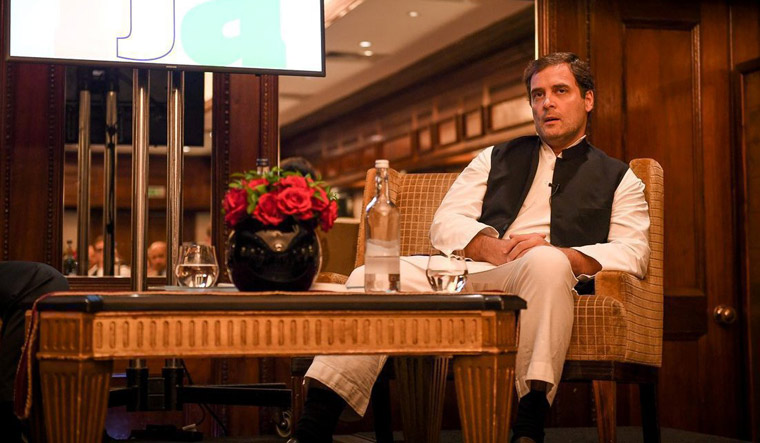The news of Rahul Gandhi's visit to the United States in September last year had met with derision from the rival camps. Political opponents sniggered at reports that trickled out about Rahul, who was about to take over as Congress president, going to the US to discuss artificial intelligence.
However, the BJP was rudely awakened by news of Rahul, at an interaction in Berkeley, University of California, making a powerful onslaught on the Narendra Modi government, in which he laid down the blueprint for what would be his party's line of attack on the ruling dispensation.
Related stories
- ‘Indian education system has serious problems’: Rahul Gandhi tells IIT-Madras students
- Actions harming opposition unity, will ask allies to expel Congress from INDIA bloc: AAP
- Kharge, Rahul Gandhi oppose new NHRC chief pick: 'Process fundamentally flawed’
- Somnath Suryavanshi killed because he was Dalit and protecting Constitution: Rahul Gandhi
Ever since, the Congress president's visits abroad, which have been portrayed as an effort to reach out to the Indian community living abroad, have had an unabashedly domestic agenda, that of making a critique of Modi and his party. And the same was the case with Rahul's just concluded visit to Germany and the UK.
Starting with Berkeley, the format of the attack on the Modi regime has been designed around the two main issues of joblessness and agrarian crisis. And the criticism of the government has included issues such as divisive politics and how the RSS and the BJP are allegedly manipulating institutions, and there has also been an effort, through references to the Rafale deal and bank scams, to puncture Modi's claims of fighting corruption. This time round, Rahul also spoke about why he hugged Modi during the no-confidence motion in the Lok Sabha in the recently concluded Monsoon Session.
However, while Rahul used his interactions in Hamburg, Berlin and London to criticise Modi and his party, it also became evident that questions asked at random by the audience at the overseas locations had the potential to upset the Congress' plan and instead give ammunition to the BJP to attack Rahul and his party. Also, a better prepared BJP was alert to spot instances in Rahul's articulation during the trip to pounce upon. It was quick to launch a counter attack through a media briefing every day, asking the Congress to explain Rahul's comments on comparing the RSS with the Muslim Brotherhood, or his statement that the Congress had no role to play in the anti-Sikh riots of 1984.
There has been much noise back home, especially with regard to Rahul's comments on the anti-Sikh riots. The BJP called Rahul an “incorrigible liar” as it posted a video on Twitter in which he reportedly said that some Congressmen may have been involved in the riots. The Congress was busy firefighting, with senior leaders rushing to Rahul's defence. Former Union minister P. Chidambaram said, “You can't hold Rahul Gandhi responsible for that. He was 13 or 14. He hasn't absolved anyone.”
Meanwhile, there was some concern within the Congress on questions being raised about Rahul deciding to go on a trip of Germany and the UK rather than visiting Kerala, which has been devastated by floods. It was felt that while the Congress president questioned the Modi government's stance towards flood-hit Kerala and even demanded that the flood in the southern state be declared a national disaster, not enough was done by him in terms of follow-up.
Rahul, back in India, has now announced that he is visiting Kerala on August 28 and 29. “I will be in Kerala tomorrow & the day after, visiting flood hit areas & relief camps in the state,” he tweeted on Monday.
The law of diminishing returns appears to be applying to Rahul's foreign sojourns.


